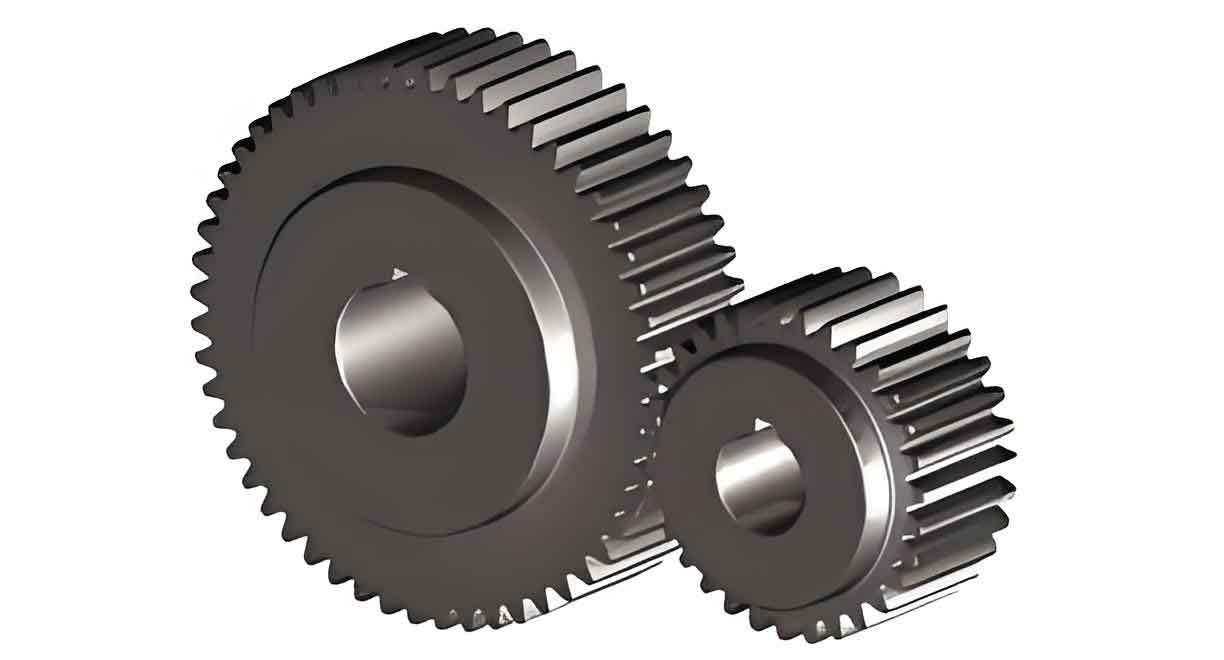
This paper investigates the nonlinear dynamics of spur gear systems under localized tooth breakage, focusing on multi-state meshing-impact phenomena. A discrete dynamic model incorporating time-varying stiffness, friction, and energy dissipation during back-side collisions is established through kinematic analysis of asymmetric engagement patterns.
1. Modeling of Multi-State Engagement
The spur gear system’s meshing behavior is categorized into five states based on relative displacement $x$ and backlash threshold $D$:
$$
\begin{cases}
\text{Double-tooth meshing:} & x \geq D \\
\text{Single-tooth meshing I:} & x \geq D \ (\text{Healthy zone}) \\
\text{Single-tooth meshing II:} & x \geq D \ (\text{Breakage zone}) \\
\text{Disengagement:} & |x| < D \\
\text{Back-side impact:} & x \leq -D
\end{cases}
$$
The dimensionless equation of motion is derived as:
$$
\ddot{x} – h(\tau,x)f(x,\dot{x}) = F + \varepsilon\omega^2\cos(\omega\tau)
$$
Where $h(\tau,x)$ represents the state transition function and $f(x,\dot{x})$ describes the nonlinear contact forces.
2. Time-Varying Parameters
Key parameters affected by localized breakage in spur gears include:
| Parameter | Expression |
|---|---|
| Meshing Stiffness | $k_m(\tau) = \left[\sum_{i=1}^3 \frac{1}{k_{hi} + k_{bi} + k_{ai} + k_{si}}\right]^{-1}$ |
| Load Distribution | $L(\xi) = \begin{cases} \frac{1}{3}\left(1 + \frac{\xi_C – \xi_A}{\xi_{D1} – \xi_A}\right) & \xi_A \leq \xi_C \leq \xi_{D1} \\ 1 & \xi_{D1} \leq \xi_C \leq \xi_D \end{cases}$ |
| Impact Force | $F_c = \frac{5R\bar{m}}{4}\left(\frac{3R\dot{x}^2(-)}{4k_c}\right)^{3/5}$ |
3. Dynamic Response Analysis
The spur gear system exhibits complex bifurcation characteristics under parameter variations:
3.1 Load Coefficient Effects
Dimensionless load $F$ significantly influences system stability:
| Load Range | Dynamic Behavior |
|---|---|
| $F > 0.12$ | Period-1 motion without back-side impact |
| $0.08 < F < 0.12$ | Coexisting period-2 and period-4 motions |
| $F < 0.08$ | Chaotic oscillations with persistent impacts |
3.2 Meshing Frequency Effects
The dimensionless frequency $\omega$ governs transition between different regimes:
$$
\omega_{critical} = \sqrt{\frac{k_{avg}}{m_e}} \pm \Delta\omega_{breakage}
$$
Where $\Delta\omega_{breakage} = 0.15$ represents the frequency shift caused by localized tooth damage.
4. Comparative Study
Essential differences between healthy and damaged spur gear systems:
| Characteristic | Healthy System | Damaged System |
|---|---|---|
| Meshing Period | $T_0 = 2\pi/z_p\omega_p$ | $T’_0 = T_0(1 + \Delta\varepsilon)$ |
| Backlash Threshold | $D = 1.0$ | $D_{eff} = 1.15D$ |
| Chaos Onset | $F < 0.10$ | $F < 0.13$ |
5. Stability Enhancement Strategies
For spur gear systems operating with localized breakage:
- Maintain dimensionless load $F > 0.15$ to avoid back-side impacts
- Optimize meshing frequency in range $1.2 < \omega < 1.8$
- Implement active damping with $c_{opt} = 0.03\sqrt{m_ek_{avg}}$
The proposed model provides fundamental insights into the nonlinear dynamics of damaged spur gear systems, enabling better fault-tolerant design and maintenance strategies for power transmission applications.
